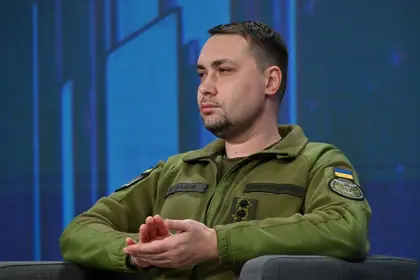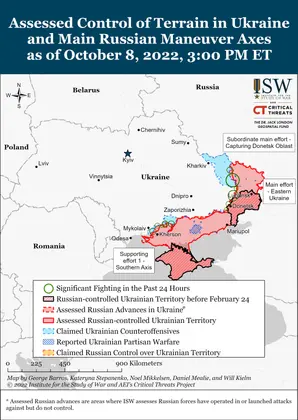Key Takeaways
- A large-scale explosion seriously damaged the Kerch Strait Bridge that links occupied Crimea with Russia.
- The Kremlin named the Russian Commander of the Aerospace Forces, Army General Sergey Surovikin, the new commander of the Russian operation in Ukraine, and this appointment has generated positive feedback within the nationalist community.
- Russian sources claimed that Ukrainian forces continued counteroffensive operations in Kharkiv and Luhansk Oblasts.
- Russian forces continued establishing defensive positions in northern Kherson Oblast.
- Russian forces continued to attack settlements around Bakhmut, Avdiivka, and west of Donetsk City.
- Ukrainian forces reportedly continued to shoot down Iranian-made Shahed-136 drones.
- Russian federal subjects are facing financial challenges in funding mobilization.
- Russian and occupation administration officials continued measures to remove Ukrainian children from their homes in Russian-occupied territories.
A large-scale explosion damaged the Kerch Strait Bridge that links occupied Crimea with Russia on October 8. Maxar satellite imagery shows that the explosion collapsed one lane of the road bridge and damaged the nearby railway track.[1] The Russian Investigative Committee stated that a truck exploded on the bridge and ignited seven fuel tanks on the railroad.[2] A small fraction of Russian milbloggers speculated that Ukrainian saboteurs used a boat to detonate the bridge from the sea, though there is no visible evidence for such a conclusion.[3] The Kremlin refrained from accusing Ukraine of sabotage or attack, echoing similar restraint following the sinking of the cruiser Moskva and the Ukrainian strike on Saky airfield in Crimea.[4] Ukraine did not claim responsibility for the incident, but The New York Times reported that an unnamed senior Ukrainian official stated that Ukrainian intelligence participated in the explosion.[5] Kremlin Spokesperson Dmitry Peskov noted that the Russian President Vladimir Putin ordered a government commission composed of government officials, security services, and the Ministry of Emergency Situations to investigate the ”emergency.”[6]
JOIN US ON TELEGRAM
Follow our coverage of the war on the @Kyivpost_official.
The explosion will not permanently disrupt critical Russian ground lines of communication (GLOCs) to Crimea, but its aftermath is likely to increase friction in Russian logistics for some time. The road bridge appears at least partially operational, and the railroad bridge did not suffer significant structural damage according to Russian reports that generally seem plausible based on the available video evidence. Russian footage shows people walking on the damaged road bridge and a train moving on the railroad bridge.[7] The Head of occupied Crimea Sergey Aksyonov claimed that the remaining lane of the road bridge opened to cars and buses after a rigorous security check, but that trucks must move by ferry.[8] The collapsed lane of the road bridge will restrict Russian military movements until it is repaired, forcing some Russian forces to rely on the ferry connection for some time. Russian forces will likely still be able to transport heavy military equipment via the railroad. Russian officials will likely intensify security checks on all vehicles crossing the bridge, however, adding delays to the movement of Russian military equipment, personnel, and supplies to Crimea. Putin has already signed a decree strengthening the security protocol on the bridge under the supervision of the Russian Federal Security Service (FSB).[9]

Ukraine’s Existence ‘At Risk’ Without Peace Talks by Summer, Says Intelligence Chief
The Kremlin is likely continuing to frame the Russian Ministry of Defense (MoD) as the scapegoat for the Kerch Bridge explosion and other Russian military failures to deflect the blame from Putin. The Russian MoD has not issued an official statement regarding the incident as of this publication.[10] Russian opposition outlet Meduza reported that the Russian Presidential Administration sent out a guide to Russian mass media on the appropriate way to downplay the severity of the damage to the bridge, and it is possible that the Kremlin has ordered the Russian MoD to remain quiet regarding the situation.[11] Russian propagandist Vladimir Solovyov stated that Russia must initiate a strike campaign on critical Ukrainian infrastructure instead of listening to Russian MoD promises.[12]
Some nationalist voices noted that Putin and his close circle are failing to immediately address the attack on a symbolic bridge, voicing direct criticism of Putin for the first time. A milblogger warned that if Putin fails to undertake retaliatory actions it “will be mistaken for the weakness of the president himself.”[13] Another milblogger noted that it is hypocritical for the Kremlin to call on Russians to rally behind Putin if he is unable to comment on significant events such as the Moskva sinking, prisoner exchanges including Azovstal fighters, or the collapse of the Kharkiv frontline.[14] Others criticized the silence of Russian Deputy Chairman of the Security Council Dmitry Medvedev regarding the explosion, given that Medvedev had made several statements defining any attacks on the Kerch Bridge as a violation of Russian ”red lines.”[15] Russian milbloggers and propagandists alike called on the Kremlin to resume strikes on Ukrainian infrastructure and notably did not make any calls for Russia to use tactical nuclear weapons against Ukraine.
Ukrainian and Russian sources claimed that the Kremlin targeted some higher military command figures following the Kerch Bridge explosion, but these reports remain unverified as of this publication. The Ukrainian Main Military Intelligence Directorate (GUR) reported that the Kremlin detained, arrested, and blocked unspecified military officials and ordered the units of the elite Dzerzhinsky Separate Operation Purpose Division to enter Moscow on October 8.[16] Milbloggers who favor the Wagner Group claimed that the Kremlin has replaced Russian Defense Minister Sergey Shoigu and Chief of General Staff Army General Valery Gerasimov supposedly with Tula Governor Alexey Dyumin and the deputy commander-in-chief of the ground forces, Lieutenant General Alexander Matovnikov, respectfully.[17] ISW cannot independently verify either of these reports at this time.
The Kremlin named the Russian Commander of the Aerospace Forces, Army General Sergey Surovikin, the new commander of the Russian operation in Ukraine, and this appointment has generated positive feedback within the nationalist community. Sorovikin previously commanded the “southern” group of forces in Ukraine and was reportedly responsible for the capture of Lysychansk in July.[18] Milbloggers shared their excitement regarding Surovikin’s appointment, noting that Surovikin has the “tough” character necessary to regain the initiative in Ukraine.[19] Wagner financier Yevgeniy Prigozhin extravagantly praised Surovikin because he “got into a tank and rushed to save” the Soviet Union during the 1991 coup attempt in Moscow.[20] Prigozhin’s interview further confirmed reports of a fissure between pro-war and “liberal” factions within the Kremlin, which ISW will consider in more detail in subsequent reports.
See the full report here.
You can also highlight the text and press Ctrl + Enter










